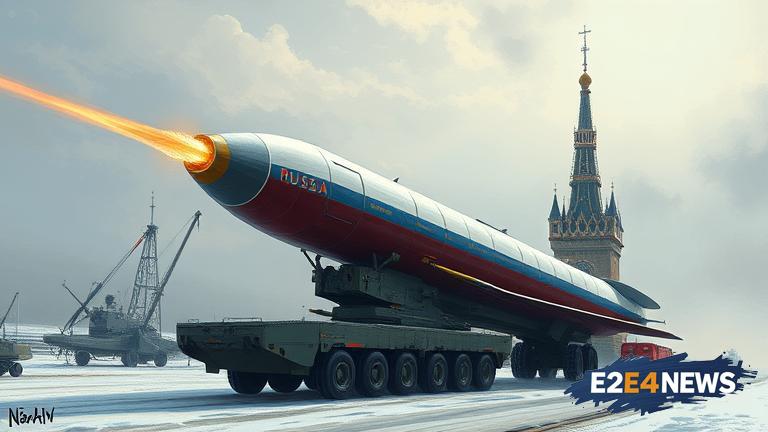In a move that has sent shockwaves throughout the international community, Russia has announced its withdrawal from the missile moratorium, a decades-long agreement that had restricted the development and deployment of certain types of missiles. The decision, which was made public on August 5, 2025, has been met with widespread criticism and concern, with many experts warning of a potential new era of global tensions and arms racing. The moratorium, which was first established in the 1980s, had prohibited the development and deployment of ground-launched missiles with ranges between 500 and 5,500 kilometers. Russia’s decision to abandon the agreement has been seen as a response to the US’s withdrawal from the Intermediate-Range Nuclear Forces Treaty (INF) in 2019. The INF Treaty, which was signed in 1987, had banned the development and deployment of ground-launched missiles with ranges between 500 and 5,500 kilometers. The US had accused Russia of violating the treaty, which led to its withdrawal. Russia, on the other hand, had accused the US of attempting to undermine the treaty and gain a military advantage. With the moratorium now abandoned, Russia is free to develop and deploy new missiles, which has sparked concerns of a potential arms race. The US and other nations are weighing their responses to Russia’s decision, with some calling for increased military spending and others advocating for diplomatic efforts to resolve the crisis. The situation has been further complicated by the ongoing conflict in Ukraine, which has pitted Russia against the US and its allies. The US has imposed sanctions on Russia in response to its actions in Ukraine, which has led to a significant deterioration in relations between the two nations. As tensions continue to escalate, there are fears of a potential military conflict between Russia and the US, which could have catastrophic consequences for global stability. The international community is calling for calm and restraint, with many leaders urging Russia and the US to engage in diplomatic efforts to resolve their differences. The United Nations has issued a statement expressing concern over the situation and calling for a return to diplomatic negotiations. The European Union has also issued a statement, condemning Russia’s decision to abandon the moratorium and calling for a strengthening of diplomatic efforts to resolve the crisis. As the situation continues to unfold, it remains to be seen how the US and other nations will respond to Russia’s decision. One thing is certain, however: the abandonment of the missile moratorium has marked a significant escalation in global tensions, and the consequences of this decision will be felt for years to come. The US and its allies are considering a range of options, including increased military spending and the development of new missiles. Russia, on the other hand, is likely to continue its military modernization efforts, which could include the development of new nuclear-capable missiles. The situation is further complicated by the fact that China, which has been expanding its military capabilities in recent years, is also likely to play a significant role in the emerging arms race. As the world watches with bated breath, it remains to be seen how the situation will unfold and what the consequences of Russia’s decision will be. The one thing that is certain, however, is that the abandonment of the missile moratorium has marked a significant turning point in global affairs, and the world will never be the same again. The US and its allies must now consider how to respond to Russia’s decision, and whether to engage in diplomatic efforts to resolve the crisis or to take a more aggressive approach. The situation is complex and multifaceted, and there are no easy answers. However, one thing is certain: the world is now a more dangerous and uncertain place, and the consequences of Russia’s decision will be felt for years to come.





